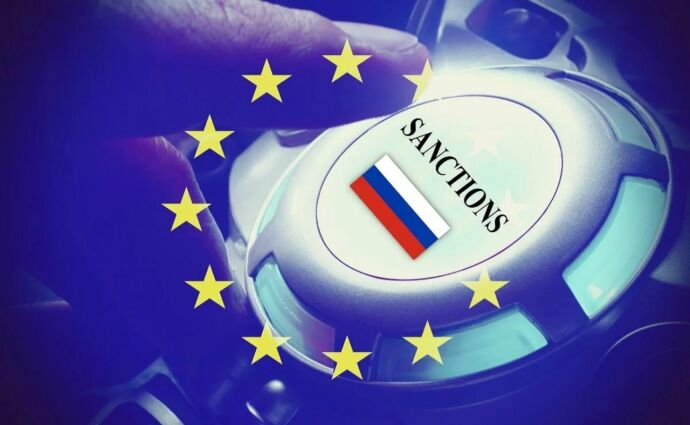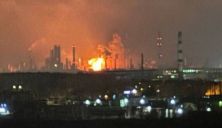Despite the embargo, price ceiling and other sanctions imposed on the Russian oil business, the aggressor country continues to trade in raw materials, albeit in much smaller volumes. Russia has created a so-called “shadow tanker fleet” and has developed schemes to partially circumvent international restrictions. The 11th sanctions package of the European Union provides for mechanisms to eliminate these loopholes, reports FREEDOM.
Despite the sanctions and diplomatic isolation of Russia, some countries continue to trade with the Russian Federation and even increase its volumes. For example, the import of Russian oil to India increased 10 times last year. At the same time, the country saved up to $5 billion through discounts and a price ceiling for Russian raw materials.
“Data analysis showed that Russian oil accounted for about 40% of India’s crude oil imports in May, pushing imports from Iraq to a three-year low and from Saudi Arabia to their lowest level since September 2021,” Reuters said in a publication. .
China also receives cheap energy from Russia. However, in general, according to experts, Moscow has significantly reduced the volume of exports of oil and oil products since the beginning of the full-scale invasion of the Russian Federation into Ukraine. This means that the state budget of the aggressor country receives less money. For example, in January 2023 alone, Moscow lost more than 52 billion rubles in oil and gas revenues.
“This is China, India, which is surprising, a little Arab Emirates and even Australia takes Russian oil a little bit. Something else is more interesting here – the fact that sanctions work very cool. Now statistics have come out that show that this year the export of Russian oil amounted to 190 million tons. But since before that the statistics were classified, sometimes they were irrelevant, I would say, but we can say that the volume of oil fell somewhere from 270 million tons per year to 190,” said energy expert Andrey Zakrevskiy.
During the first year of Russia’s full-scale war against Ukraine, Western companies helped smuggle more than 530 million barrels of oil from Russia. Transactions, albeit in a much smaller volume, were also concluded in 2023. Due to sanctions, oil was delivered by the so-called STS method – Ship-to-Ship Transfer. This is when raw materials are reloaded not at the port, but directly at sea. Not only are such manipulations nothing more than actually fraudulent schemes to bypass international restrictions, but they also pose a serious threat to the marine area. Some of these STS deals involve oil spills at sea.
“Any operations, high-tech operations with oil just because oil is oil, and even, you know perfectly well that a liter of oil can spoil a square kilometer of the sea surface, is dangerous. When logistics used to work normally, and it all happened in ports, everything happened under great technological control, and everything was convenient, but when a ship hangs out at sea and reloads something from one, it always doesn’t bring anything good, ” Zakrevskiy said.
To close loopholes around the restrictions, the 11th EU sanctions package provides for tighter controls on ships that transport oil. If the relevant authorities suspect that the company is transporting raw materials from the Russian Federation, its tankers will not be able to enter the ports of the EU countries.
“In the event of such suspicions or the establishment of facts, these vessels will not be allowed into the terminals and ports of the European Union. That is, this is a rather serious measure, and let’s hope that the European Union will nevertheless be more actively involved in this issue than before. Because today there is a “shadow fleet” of more than 150 ships, where such operations are taking place to circumvent sanctions,” said Vladimir Omelchenko, director of energy programs at the Razumkov Center.
However, according to experts, the restrictions in the 11th sanctions package are not enough to completely deprive the Russian Federation of oil and gas revenues.
“When oil is delivered, for example, to refineries in India, Singapore, Turkey or other countries, it is processed there, oil products are obtained with a new commodity code. And also these oil products often end up not only on the European Union market, but also on the Ukrainian market. That is, it is very difficult to do anything here, because such operations are not prohibited by the sanctions package of the European Union and the G7 countries,” Omelchenko said.
According to the Russian Ministry of Finance, the basic oil and gas revenues of the Russian Federation in 2023 were projected at the level of 8 billion rubles. However, as of early March, even before the introduction of the latest restrictions, the figure had fallen to 6 billion.
Earlier, on June 23, the Council of the European Union approved the 11th package of sanctions against Russia. Its main difference is the presence of methods of influencing countries through which parallel imports and sanctioned goods continue to flow to the Russian Federation.














